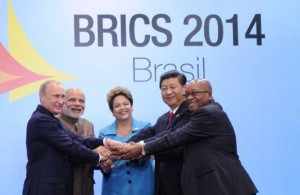
BRICS countries have condemned terrorism in all its forms and said there can be no justification for terror, while advocating peaceful resolution of conflicts.
The Fortaleza Declaration was adopted by the BRICS (Brazil, Russia, India, China, South Africa) countries Tuesday at their sixth summit meeting in this Brazilian city.
The declaration said the United Nations had a central role in coordinating action against terrorism.
“We call upon all entities to refrain from financing, encouraging, providing training for or otherwise supporting terrorist activities,” it said.
Indian Prime Minister Narendra Modi, in his speech at the summit, said there should be zero tolerance towards terrorism. He also said selective targeting of terrorism will not work and terrorist forces, especially states flouting basic norms, should be isolated.
The declaration also expressed concern at the increasing use by terrorists and their supporters, of information and communications technologies (ICTs).
BRICS countries expressed deep concern over the situation in Syria, Ukraine and Iraq.
Referring to Iraq where security forces are seeking to take back territory seized by militants, BRICS countries said they strongly supported the Iraqi government in its effort to overcome the crisis and uphold territorial integrity.
“We are concerned about spill-over effects of the instability in Iraq resulting from increased terrorist activities in the region, and urge all parties to address the terrorist threat in a consistent manner.”
On Ukraine, the BRICS countries called for a comprehensive dialogue, de-escalation of the conflict and restraint from all the actors involved “with a view to finding a peaceful political solution in full compliance with the UN charter”.
Referring to Syria, BRICS expressed deep concern over violence and condemned increasing violations of human rights by all parties.
“We call upon all parties to commit immediately to a complete cease-fire, to halt violence and to allow unimpeded access for humanitarian organisations and agencies,” the declaration said.
The BRICS countries reaffirmed their commitment to contribute to a comprehensive and lasting settlement of the Arab-Israeli conflict.
“We believe the resolution of the Israeli-Palestinian conflict is a fundamental component for building a sustainable peace in the Middle East. We call upon Israel and Palestine to resume negotiations leading to a two-state solution with a contiguous and economically viable Palestinian state existing side by side in peace with Israel.”
BRICS opposed “continuous construction and expansion of settlements in the occupied Palestinian territories by the Israeli government”, and said it violates international law, gravely undermines peace efforts and threatens the viability of the two-state solution.
Referring to the Iranian nuclear issue, BRICS countries said there was no alternative to a negotiated solution and reaffirmed their support to its resolution through political and diplomatic means and dialogue.
“We recognise Iran’s inalienable right to the peaceful use of nuclear energy in a manner consistent with its international obligations,” the declaration said.
On Afghanistan, the BRICS countries said the country needs development assistance and foreign investment to attain lasting peace and stability.
“We expect a broad-based and inclusive peace process in Afghanistan which is Afghan-led and Afghan-owned.”
The BRICS countries called for a more concerted action to tackle piracy at sea and drug problem.
The declaration said BRICS was committed to establishing a post-Bali work programme for concluding the ongoing Doha Round, so as to build an “open, inclusive, non-discriminatory, transparent and rule-based multilateral trading system.”
The five countries said they will facilitate cooperation on combating cyber-crimes and negotiate to build “a universal legally binding instrument in the field”.
The BRICS also called on a conclusion of global climate change negotiations for a legally binding agreement in accordance with the UN Framework Convention on Climate Change, especially the “common but differentiated responsibilities and respective capabilities”.
In terms of outer space code of conduct, the five countries said they are open to “an inclusive and consensus-based multilateral negotiation”, adding the exploration and uses of outer space shall be for peaceful purposes so as to prevent an arms race.
The bloc said it supports the UN to organise commemorative events to mark the 70th anniversary of World War II in 2015, stressing the importance to secure “a just and fair international order based on the UN Charter”.